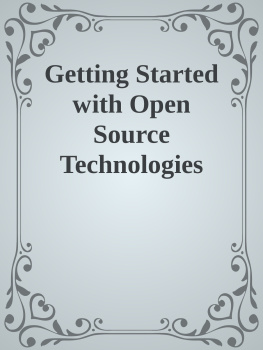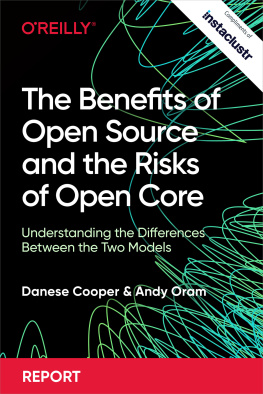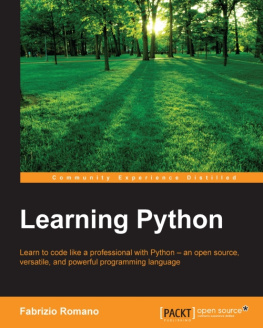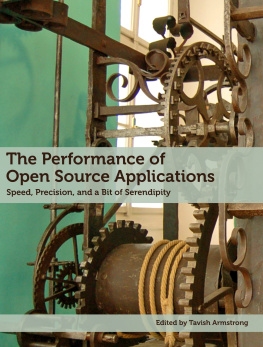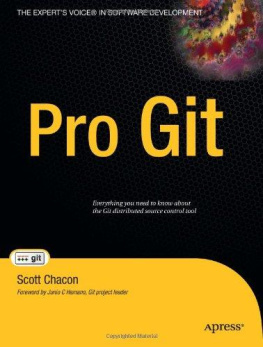Diomidis Spinellis - Code Reading: The Open Source Perspective
Here you can read online Diomidis Spinellis - Code Reading: The Open Source Perspective full text of the book (entire story) in english for free. Download pdf and epub, get meaning, cover and reviews about this ebook. year: 2010, publisher: Addison-Wesley, genre: Computer. Description of the work, (preface) as well as reviews are available. Best literature library LitArk.com created for fans of good reading and offers a wide selection of genres:
Romance novel
Science fiction
Adventure
Detective
Science
History
Home and family
Prose
Art
Politics
Computer
Non-fiction
Religion
Business
Children
Humor
Choose a favorite category and find really read worthwhile books. Enjoy immersion in the world of imagination, feel the emotions of the characters or learn something new for yourself, make an fascinating discovery.

- Book:Code Reading: The Open Source Perspective
- Author:
- Publisher:Addison-Wesley
- Genre:
- Year:2010
- Rating:5 / 5
- Favourites:Add to favourites
- Your mark:
- 100
- 1
- 2
- 3
- 4
- 5
Code Reading: The Open Source Perspective: summary, description and annotation
We offer to read an annotation, description, summary or preface (depends on what the author of the book "Code Reading: The Open Source Perspective" wrote himself). If you haven't found the necessary information about the book — write in the comments, we will try to find it.
Code Reading: The Open Source Perspective — read online for free the complete book (whole text) full work
Below is the text of the book, divided by pages. System saving the place of the last page read, allows you to conveniently read the book "Code Reading: The Open Source Perspective" online for free, without having to search again every time where you left off. Put a bookmark, and you can go to the page where you finished reading at any time.
Font size:
Interval:
Bookmark:
The Open Source Perspective
Diomidis Spinellis

Boston San Francisco New York Toronto Montreal
London Munich Paris Madrid
Capetown Sydney Tokyo Singapore Mexico City
Many of the designations used by manufacturers and sellers to distinguish their products are claimed as trademarks. Where those designations appear in this book, and Addison-Wesley was aware of a trademark claim, the designations have been printed with initial capital letters or in all capitals.
The author and publisher have taken care in the preparation of this book, but make no expressed or implied warranty of any kind and assume no responsibility for errors or omissions. No liability is assumed for incidental or consequential damages in connection with or arising out of the use of the information or programs contained herein.
The publisher offers discounts on this book when ordered in quantity for bulk purchases and special sales. For more information, please contact:
U.S. Corporate and Government Sales
(800) 382-3419
For sales outside of the U.S., please contact:
International Sales
Visit Addison-Wesley on the Web: www.awprofessional.com
Library of Congress Cataloging-in-Publication Data
Spinellis, Diomidis.
Code reading / Diomidis Spinellis.
p. cm.
Contents: The open source perspective.
Includes bibliographical references and Index.
ISBN 0-201-79940-5 (pbk. : alk. paper)
1. Computer programming. 2. Coding theory. I. Title.
QA76.6 .S675 2003
005.1dc21 2002038563
Copyright 2003 by Pearson Education, Inc.
All rights reserved. No part of this publication may be reproduced, stored in a retrieval system, or transmitted, in any form, or by any means, electronic, mechanical, photocopying, recording, or otherwise, without the prior consent of the publisher. Printed in the United States of America. Published simultaneously in Canada.
For information on obtaining permission for use of material from this work, please submit a written request to:
Pearson Education, Inc.
Rights and Contracts Department
75 Arlington Street, Suite 300
Boston, MA 02116
Fax: (617) 848-7047
ISBN 0-201-79940-5
Text printed in the United States at Offset Paperback Manufacturers in Laflin, Pennsylvania.
11th Printing March 2009
Scott Meyers, Consulting Editor
The Effective Software Development Series provides expert advice on all aspects of modern software development. Books in the series are well written, technically sound, of lasting value, and tractable length. Each describes the critical things the experts almost always door almost always avoid doingto produce outstanding software.
Scott Meyers (author of the Effective C++ books and CD) conceived of the series and acts as its consulting editor. Authors in the series work with Meyers and with Addison-Wesley Professional's editorial staff to create essential reading for software developers of every stripe.
For more information on books in this series please see www.awprofessional.com/esds
TITLES IN THE SERIES
Elliotte Rusty Harold, Effective XML: 50 Specific Ways to Improve Your XML 0321150406
Ted Neward, Effective Enterprise Java 0321130006
Diomidis Spinellis, Code Reading: The Open Source Perspective 0201799405
Diomidis Spinellis, Code Quality: The Open Source Perspective 0321166078
Bill Wagner, Effective C#: 50 Specific Ways to Improve Your C# 0321245660
We're programmers. Our job (and in many cases our passion) is to make things happen by writing code. We don't meet our user's requirements with acres of diagrams, with detailed project schedules, with four-foot-high piles of design documentation. These are all wishesexpressions of what we'd like to be true. No, we deliver by writing code: code is reality.
So that's what we're taught. Seems reasonable. Our job is to write code, so we need to learn how to write code. College courses teach us to to write programs. Training courses tell us how to code to new libraries and APIs. And that's one of the biggest tragedies in the industry.
Because the way to learn to write great code is by reading code. Lots of code. High-quality code, low-quality code. Code in assembler, code in Haskell. Code written by strangers ten thousand miles away, and code written by ourselves last week. Because unless we do that, we're continually reinventing what has already been done, repeating both the successes and mistakes of the past.
I wonder how many great novelists have never read someone else's work, how many great painters never studied another's brush strokes, how many skilled surgeons never learned by looking over a colleague's shoulder, how many 767 captains didn't first spend time in the copilot's seat watching how it's really done.
And yet that's what we expect programmers to do. This week's assignment is to write.... We teach developers the rules of syntax and construction, and then we expect them to be able to write the software equivalent of a great novel.
The irony is that there's never been a better time to read code. Thanks to the huge contributions of the open-source community, we now have gigabytes of source code floating around the 'net just waiting to be read. Choose any language, and you'll be able to find source code. Select a problem domain, and there'll be source code. Pick a level, from microcode up to high-level business functions, and you'll be able to look at a wide body of source code.
Code reading is fun. I love to read others' code. I read it to learn tricks and to study traps. Sometimes I come across small but precious gems. I still remember the pleasure I got when I came across a binary-to-octal conversion routine in PDP-11 assembler that managed to output the six octal digits in a tight loop with no loop counter.
I sometimes read code for the narrative, like a book you'd pick up at an airport before a long flight. I expect to be entertained by clever plotting and unexpected symmetries. Jame Clark's gpic program (part of his GNU groff package) is a wonderful example of this kind of code. It implements something that's apparently very complex (a declarative, device-independent picture-drawing language)in a compact and elegant structure. I came away feeling inspired to try to structure my own code as tidily.
Sometimes I read code more critically. This is slower going. While I'm reading, I'm asking myself questions such as Why is this written this way? or What in the author's background would lead her to this choice? Often I'm in this mode because I'm reviewing code for problems. I'm looking for patterns and clues that might give me pointers. If I see that the author failed to take a lock on a shared data structure in one part of the code, I might suspect that the same might hold elsewhere and then wonder if that mistake could account for the problem I'm seeing. I also use the incongruities I find as a double check on my understanding; often I find what I think is a problem, but it on closer examination it turns out to be perfectly good code. Thus I learn something.
In fact, code reading is one of the most effective ways to eliminate problems in programs. Robert Glass, one of this book's reviewers, says, by using (code) inspections properly, more than 90 percent of the errors can be removed from a software product before its first test. In the same article he cites research that shows Code-focused inspectors were finding 90 percent more errors than process-focused inspectors. Interestingly, while reading the code snippets quoted in this book I came across a couple of bugs and a couple of dubious coding practices. These are problems in code that's running at tens of thousands of sites worldwide. None were critical in nature, but the exercise shows that there's always room to improve the code we write. Code-reading skills clearly have a great practical benefit, something you already know if you've ever been in a code review with folks who clearly don't know how to read code.
Font size:
Interval:
Bookmark:
Similar books «Code Reading: The Open Source Perspective»
Look at similar books to Code Reading: The Open Source Perspective. We have selected literature similar in name and meaning in the hope of providing readers with more options to find new, interesting, not yet read works.
Discussion, reviews of the book Code Reading: The Open Source Perspective and just readers' own opinions. Leave your comments, write what you think about the work, its meaning or the main characters. Specify what exactly you liked and what you didn't like, and why you think so.


